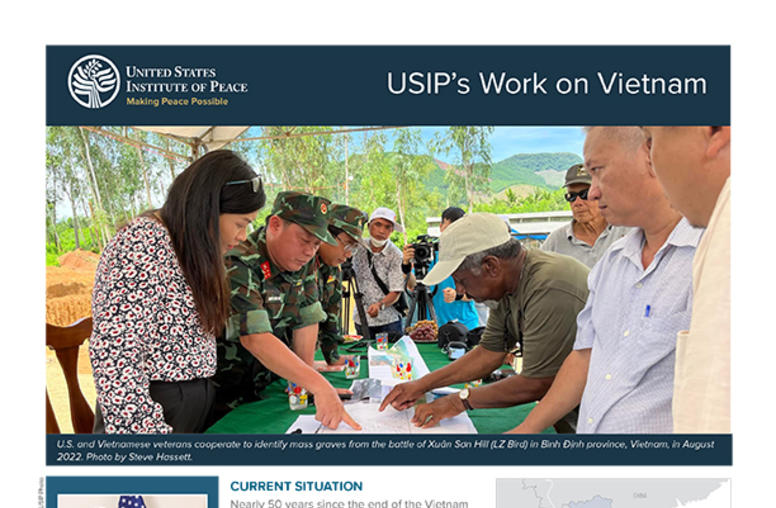Publications
Articles, publications, books, tools and multimedia features from the U.S. Institute of Peace provide the latest news, analysis, research findings, practitioner guides and reports, all related to the conflict zones and issues that are at the center of the Institute’s work to prevent and reduce violent conflict.

Four Priorities for Sudan a Year into the Civil War
This week marks a year of war in Sudan. A once promising revolution that led to the overthrow in 2019 of the country’s longtime dictator, Omar al-Bashir, has devolved into a devastating civil war. The fighting started over a dispute on how to incorporate the paramilitary Rapid Support Forces (RSF) into the country’s military, the Sudan Armed Forces (SAF). A year later as the conflict between the RSF and SAF grinds on, Sudan is experiencing the world’s worst displacement crisis and one of the world’s worst hunger crises in recent history.

Huawei’s Expansion in Latin America and the Caribbean: Views from the Region
Since its founding in Shenzhen, China, in 1987, Huawei has grown into one of the world’s major information and communications technology companies, but its ties to China’s government and military have been regarded by US officials as a potential risk to national security. Latin American and Caribbean countries, however, have embraced the company for the economic and technological benefits it provides. This report explains the stark contrast between Huawei’s standing in the United States and its neighbors to the south.

The Indo-Pacific’s Newest Minilateral Emerges
Last week, Philippines President Ferdinand Marcos Jr. stepped foot in the Oval Office for the second time in a year. Joining Marcos this time was Japanese Prime Minister Fumio Kishida, the leader of the United States’ most important ally in Asia and, arguably, the world. The Philippines has long been among a second rung of regional allies, so this first-ever trilateral summit marks Manila’s entrance as a leading U.S. ally working to maintain order and prevent Chinese revisionism in East Asia.

What Sweden’s Accession Shows About NATO’s Future
As NATO celebrates its 75th anniversary, it has cause to celebrate Sweden’s addition as the 32nd member of the alliance. The Nordic country’s accession came after a grueling, two-year fight with NATO member states Turkey and Hungary, both of which extracted concessions in exchange for allowing the process to move forward. Sweden’s entry will improve NATO’s capabilities and greatly reduce the vulnerability of its northeastern flank. But the difficulties it took to reach this point raise serious questions about the alliance’s ability to cohere around shared political and strategic objectives in a time of crisis.

Binalakshmi Nepram on Elevating the Voices of Indigenous Peacebuilders
As part of the first-ever Global Summit on Indigenous Peacebuilding, indigenous leaders have created a worldwide network to share knowledge and advocate for “indigenous people and indigenous processes … [to] be woven into the larger fabric” of the peacebuilding field, says USIP’s Binalakshmi Nepram.

Iran’s Attack and the New Escalatory Cycle in the Middle East
The Middle East is entering a new phase after unprecedented attacks by Israel and Iran during the first two weeks of April. Robin Wright, a senior fellow at USIP and the Woodrow Wilson Center who has covered the region for a half century, explores what happened, the strategic implications, the political context and the divided world reaction.

China’s Alternative Approach to Security Along the Mekong River
Speaking about “the rise” or the “emerging role” of the People’s Republic of China (PRC) makes little sense these days. The country is no longer simply transforming in a major power, but rather has achieved a level of influence that many other major countries around the world perceive as a threat economically, politically and militarily.

The Current Situation in Vietnam
Nearly 50 years since the end of the Vietnam War, and more than a quarter-century since the normalization of U.S.-Vietnam relations, Vietnam is emerging as a rising power at the heart of the Indo-Pacific region and an increasingly important U.S. partner. Once one of the world’s poorest and most isolated countries, Vietnam is now a middle-income country with a dynamic, young population and a promising future.

Increasing Information Access for the North Korean People
In recent years, North Korea has become more repressive, more impoverished and more allergic to the outside world. Already turning inward after the failure of diplomatic efforts in 2019, the North Korean government isolated itself further amid the global COVID-19 pandemic. North Korea has learned to operate, and Kim Jong Un has learned to rule, with greater levels of self-isolation than aggressive international sanctions regimes could ever hope to impose. Given North Korea’s current mode of rejecting even humanitarian assistance and its recent turn toward Russia, the chances for diplomatic breakthroughs with Pyongyang look like a wishful long-term hope at best.

To Help Stabilize West Africa, Bolster a Key Partner: Nigeria
Continued violence in West Africa is sharpening America’s critical challenge to reduce extremism and violence, particularly in the Sahel. Violent deaths in three western Sahel nations surged by 38% last year and Niger’s coup has complicated the U.S. military role in the region. The violence is likely to spread further this year into coastal West Africa, a region five times more populous, with commensurately greater security implications for Africa, the United States and the world. A vital partner in stabilizing both regions is Nigeria, and U.S. institutions should consider several priorities for helping it do so.